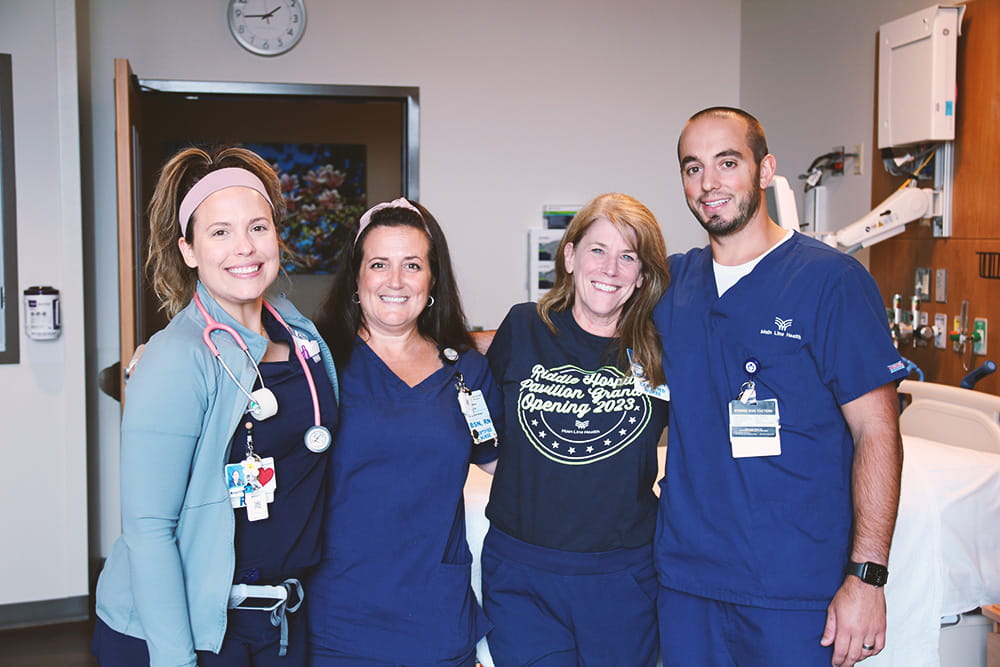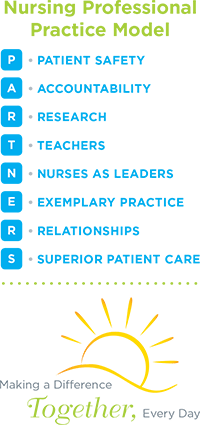Nursing

Nursing at Main Line Health
Main Line Health nursing is a group of caring, dedicated professionals who provide superior patient care at four of the Philadelphia region's most respected acute-care hospitals — Lankenau Medical Center, Bryn Mawr Hospital, Paoli Hospital and Riddle Hospital — as well as Bryn Mawr Rehab Hospital, one of the nation's premier facilities for rehabilitative medicine.
Main Line Health nurses foster partnerships with each other, physicians, multidisciplinary teams, patients, families and the greater community to yield excellent outcomes. Using evidence-based practice and conducting research, Main Line Health nurses elevate quality and patient safety in a dynamic work culture.

Explore our current opportunities
- Acute care
- Ambulatory care
- Behavioral health
- Case management and care coordination
- Clinical nursing education
- Home care and hospice
- Nursing leadership
- Nursing students and graduates
- System Travel Agility Team: STAT
Current Main Line Health employees interested in opportunities with another department can use this link to view our current employee postings.
Meet our Chief Nursing Officer
Elizabeth (Betty) Craig, DNP, RN, FACHE, serves as senior vice president and chief nursing officer for Main Line Health and brings numerous levels of progressive leadership throughout an impressive career.
Betty Craig leads and oversees nearly 3,000 nurses while cultivating the nursing education, nursing leadership and nursing research within the organization. She also shares responsibility for Safety, Quality, Equity and Affordability within the system while ensuring consistent standards of practice across the clinical setting. As a member of the executive team, she supports and facilitates a collaborative, interdisciplinary team approach to the delivery of care.
Continuing education and career development
Nursing leaders at Main Line Health are committed to the professional growth and advancement of its nursing staff. Whether new to the profession or seasoned professionals, Main Line Health nurses are encouraged to further their knowledge and training, develop new skills, and keep abreast of all the rapid and dynamic changes taking place in healthcare. We offer many opportunities to take on greater responsibilities and move on to leadership and management roles as their skills and experience develop.
Among our programs for professional development:
Clinical ladder program — This multi-level career advancement program nurtures and recognizes nurses' performance and progress as they move from the novice stages of their careers through to higher levels of proficiency. Nurses are evaluated and elevated based on their competence, clinical expertise, leadership abilities and role model behaviors.
The Clinical Ladder Program provides opportunity for both professional and clinical growth in nursing practice, above and beyond day-to-day nursing activities. The focus of this program is to advance professional nursing practice at Main Line Health and to continue to raise the standard of clinical excellence. Consistent bedside nursing excellence is the expectation of all nurses at Main Line Health. This is compensated annually through merit increases at the time of the performance appraisal.
Advancement in the Clinical Ladder Program is a voluntary and selective process designed to recognize and compensate those professionals who contribute more than routine clinical excellence; demonstrate a greater depth of clinical and leadership practice and assume additional responsibilities that benefit their areas of practice and impact positively on nursing and patient care at Main Line Hospitals.
Shared decision making council — This shared-decision making approach to problem-solving promotes unit and nursing excellence. There are six system councils with representation from bedside nurses, educators and leaders in the areas of:
- Professional development
- Clinical practice
- Research and innovation
- Management
- Healthy work environment
- Quality and safety
These councils report up through the Nursing Executive Council with representation of the chief nursing officer, nursing vice presidents and an elected unit council chair from each hospital. Each unit develops measurable, concrete goals/ground rules for their council that reflect the scope and needs of the unit. Main Line Health nurses regularly meet as a unit with a structured process to encourage individuals to contribute to the unit's activities and work environment, as well as to cultivate leadership, ownership and job satisfaction.
Continuing education — Main Line Health offers materials and assistance for nurses to get the Continuing Education Units (CEUs) to maintain their certification and licensure including classes, coursework, presentations and the ability to attend conferences and symposia.
Tuition reimbursement — Main Line Health nurses are encouraged to seek advanced academic degrees and certification through a generous tuition reimbursement package. Reimbursement is for tuition, certification, exam, or re-certification costs. Full-time benefits eligible employees will be reimbursed 100 percent of their eligible expenses up to $6,000 annually. Pro-rated reimbursement for part-time employees according to bi-weekly hours worked. Eligibility: following 90 days of service; authorized to work at least 32 hours per pay period.
Computer-based training — Main Line Health makes it easy for nurses to stay up-to-date on the latest technology and developments in nursing and medicine with access to educational software, presentations, and training materials that can be viewed 24/7 through workstations at all Main Line Hospitals locations or remotely via the internet.
Seminars and workshops — From informative lectures by guest speakers to group presentations by our own leaders and peers, Main Line Health nursing hosts many opportunities for members of the staff to mix, mingle, share and learn new ideas and techniques.
Professional practice model

The Nursing Professional Practice Model illustrates that Main Line Health nurses are key partners in providing superior patient care, every day, through leadership, collaboration, best practices and professional growth.
What is a professional practice model? A professional practice model is a system or framework that supports professional nurses in their everyday practice. This model supports our belief in the importance of superior patient care based on partnerships between nursing and other clinicians, patients, families and the community.
Why is it important to have a model? A professional practice model defines the components of nursing practice in a way that brings significance to our daily work. At Main Line Health, this professional practice model unifies nursing practice throughout the system.
What is the significance of the sun? The rising sun represents a new day, every day, while the sun itself symbolizes comfort, energy, light and something that is ever present.
Why join Main Line Health?
Nurses at Main Line Health provide superior, patient-centered care that is beyond compare. We believe in putting the patient first. We listen. We counsel. We intercede on the patient's behalf. We orchestrate a wide variety of personalized services, all designed to maximize the patient's comfort, safety and well-being.
What distinguishes Main Line Health nurses is the degree of autonomy and accountability they exhibit. Our nurses are encouraged and expected to be proactive for their patients in an environment that encourages critical thinking and professional growth. In addition, our nurses have an exceptionally collaborative relationship with our physicians who, in turn, greatly depend upon our nurses' assessments and decision-making.
Main Line Health nurses exhibit leadership at all levels of the system as executives, managers, educators, staff nurses and nurse researchers. In fact, not one but two of our hospital presidents are nurses.
We provide a safe, welcoming work environment with flexible works schedules and competitive compensation. What's more, we are committed to workplace diversity and encourage continuing education and career development.
It's no wonder our nurses have an average of 11 years of continued employment at Main Line Health, or why some nurses have been known to regularly commute up to 200 miles just to work here.
Nurse residency program
New nurse graduates can transition from classroom to practice and gain valuable experience working as a full time nurse in most clinical areas. Our Nurse Residency program offers a 12 month cohort that provides novice nurses with professional development and Vizient curriculum to help become the best nurse they can be, so they can provide the best care to their patients.
Nurse externship program
Nursing students who are actively enrolled in an accredited nursing program will enjoy gaining patient care experience through this externship. The Nurse Extern role is a year-round position that helps nursing students develop a basic skillset, confidence in patient care, and is a first step in building a career at Main Line Health.
Perioperative Fellowship
Registered nurses interested in becoming an OR nurse may apply for the Perioperative Fellowship Program. This program is offered for new graduate nurses and experienced acute care nurses interested in making the transition to the operating room.
Graduate nursing rotation requests
Graduate nursing students (clinical or non-clinical) pursuing master's or doctorate degrees can request preceptors at Main Line Health sites via the MLH Graduate Nursing Data Collection Form. Preceptor placement is not guaranteed; schools and students should use their professional connections. All graduate schools are required to have an affiliation agreement with Main Line Health before students rotate.